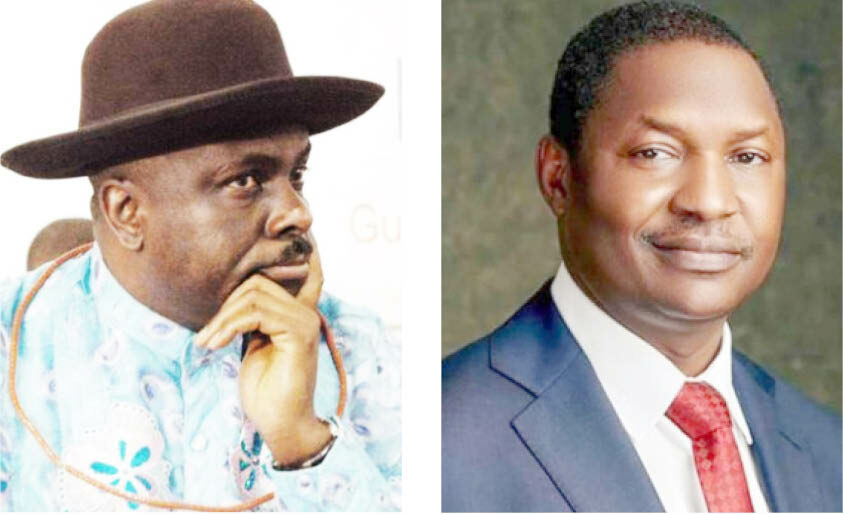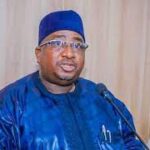There have been divergent opinions, less than one week to the return of the £4.2 million loot recovered from the former governor of Delta State, James Ibori, stashed in the United Kingdom.
This is even as the office of the Attorney General of the Federation has said it will not change its plan to use the recovered funds for the projects enumerated.
- Beware of COVID-19 third wave, PTF tells Nigerians
2 dead, 160 hospitalised as strange disease spreads in Kano
“The Honourable Attorney General has visited several media stations and said the same thing; that the money will be used for those projects,” the media aide to the AGF, Dr Umar Gwandu, said over the weekend.
During the announcement ceremony on Tuesday, the AGF said the funds would be used for the completion of ongoing work on the 2nd Niger Bridge, Abuja-Kano and Lagos-Ibadan expressways, which were already being funded by the recovered $311m Abacha loot III.
He said a reputable civil society organisation has been incorporated to monitor the use of the funds for the ongoing projects under the management of the Nigerian Sovereign Investment Authority (NSIA).
“It is to be recalled that the Nigerian government had all along provided the required mutual assistance and backup to the British authorities while the prosecution of James Ibori lasted in London and today, we are rightfully taking benefit of that cooperation. I cannot but observe that what we are witnessing today is a glaring manifestation of the agelong national ties between the Federal Republic of Nigeria and the United Kingdom,” he said.
In her remarks, the British High Commissioner to Nigeria, Ms. Catriona Laing, said the first tranche of the funds was a culmination of many years of legal battle.
Also, an official of the High Commission, Andrew Clowes, pledged the UK’s determination to cooperate with Nigeria in the fight against corruption and illicit financial flows, adding that the $10bn quoted to leave Nigeria annually equates to stealing $50 from every citizen of Nigeria every year.
The Nigerian government had signed an MoU with the UK in 2016 for the repatriation of the funds recovered from family and associates of Ibori laundered to the UK.
Ibori, who was governor between 1999 and 2007, in 2012 pleaded guilty in a UK court to charges of money laundering, conspiracy to defraud and forgery. He was sentenced to an aggregate 13 years jail term.
The Delta State government fired the first indication that it would challenge the use of the funds for the proposed federal government projects through the Commissioner for Information, Ehiedu Aniagwu.
“We would try to take advantage of the legal system to make the federal government correct the injustice they are about to visit on us as a state,” he said.
“If they are quite sure that the funds, they are about to repatriate left Delta State on account of those who have governed the state in the past, on what basis would they now take the money to another place? Under which law?”
He said the federal government can only take a percentage for the cost of the recovery and deploy the funds into federal roads in the state.
Meanwhile, a civil society organisation involved in asset recovery, the Africa Network for Environment and Economic Justice (ANEEJ) has advised the United Kingdom to openly disclose the full amount recovered from Ibori, and for the Nigerian government to review the recently signed annex to the 2016 MoU on £4.2 million assets for its return to Delta State.
ANEEJ’s executive director and head of Transparency and Accountability in Management of Returned Assets (MANTRA) project, Rev David Ugolor, in a statement wondered why returned asset of people of Delta State is to be used to finance federal infrastructural projects.
Human rights lawyer, Femi Falana (SAN) also said that the £4.2m asset recovered from former governor of Delta State, James Ibori must be returned to the state.
During the ceremony with the UK High Commission announcing the return on Wednesday, the Attorney General of the Federation and Minister of Justice, Abubakar Malami (SAN) said the funds would be used to complete ongoing work on the Second Niger Bridge, Abuja-Kano road and the Lagos-Ibadan road.
But Falana said the federal government cannot convert the recovered sum under local and international law, noting that the repatriated funds from Joshua Dariye and DSP Alamieyesigha in the UK were given to their respective states of Plateau and Bayelsa.
“In AG Lagos State v AGF it was held that the Federal Government lacks the vires to confiscate or seize the fund payable to the local governments in Lagos State from the Federation Account. Since it is not in doubt that the £4.2 million belongs to Delta State the federal government cannot, under any law, seize the fund and use it to fix Kano-Abuja road and Lagos-Ibadan road. Why not Warri-Asaba road?” He asked.
Falana said the MoU signed with the British Government in 2016 for the repatriation, which has not been domesticated by the National Assembly under Section 12 of the Nigerian Constitution, is of no legal effect whatsoever.
For his part, the chairman of the Presidential Advisory Committee Against Corruption (PACAC), Professor Itse Sagay, said using the funds which came from Delta State for federal projects would amount to injustice against the people of the state.
“The money came from Delta State. Naturally, it must go back to Delta State. I know the basis of the federal government’s argument. It is not just about the MoU. There is a provision in the EFCC Act which says all monies recovered should go to the federal government,” he said.
Professor Epiphany Azinge (SAN) on his part said since the funds is treated as proceeds of fraud, they have to return to the state where they were taken.
Also, members of the House of Representatives on Wednesday debated the motion at plenary and unanimously adopted a motion jointly moved by Delta representatives urging the federal government, through the Federal Ministry of Finance, Budget and National Planning, to “stop forthwith further appropriation/and or disbursement of recovered loot of £4.2m pending the final determination of the matter by the House.”
There are some persons who have argued that the funds cannot be returned to Delta State since it is not a party to the Mutual Legal Assistance, an international instrument used by Nigeria to engage the UK.
There are also comments that Delta State government, which had initially averred that the former governor did not steal from its coffers, part of the reason for his acquittal by a high court in the state, later appeared before an Abuja Federal High Court in 2012, to lay claim to a $15 million allegedly offered to former EFCC chairman Nuhu Ribadu to halt the investigation into the Ibori case.

 Join Daily Trust WhatsApp Community For Quick Access To News and Happenings Around You.
Join Daily Trust WhatsApp Community For Quick Access To News and Happenings Around You.


